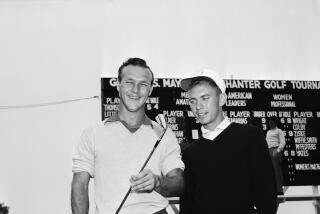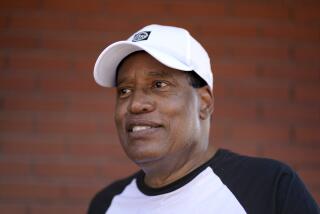18 Years Later, Lee Elder Sees Some Welcomed Changes in South Africa
- Share via
JOHANNESBURG, South Africa — The last time Lee Elder was in South Africa he rattled the apartheid cage and the lion of racial bigotry growled, as it was wont to do in those days when the only blacks on the golf courses were usually caddies and when Prime Minister John Vorster was busy making the country the Land of Separate Freedoms.
That was 1971, when Elder was here for the South African Open and PGA tours, and he angrily told the local golf writers that he wouldn’t come back until apartheid was abolished.
Visiting black celebrities were legally classified “honorary whites” at that time and were exempted from some of the more onerous segregation laws, but thousands of ordinary South African blacks were being jailed daily for nothing more than walking in the street without their passbooks.
It rankled Elder, a Washingtonian who knows something about racial intolerance but overcame it to become one of the United States’ top black golfers on the PGA Tour and, later, a leading seniors player.
Apartheid still hasn’t been abolished, but Elder was back in South Africa over the weekend, shooting a 219 over 54 holes for eighth place in the $250,000 First National Bank Seniors Classic that ended March 12at the par-72 Randpark Golf Club.
He was 12 strokes off the pace set by South African Harold Henning, nine behind runner-up Bob Charles of New Zealand and eight behind South African Gary Player, who was third. Elder added $17,000 to the $27,000 he had won in four events this year, and also got a close-up look at what he said is a changing South Africa.
“I know apartheid is still around, but there have been a lot of changes since I was here the last time. I really feel it’s just a matter of time, and you don’t solve a problem by running away from it,” said Elder, who has been playing the seniors circuit since 1984.
So far, Washington’s usually vocal sports sanctions lobby in Washington hasn’t commented on his breaking the South African boycott, possibly because he obtained a sports visa directly from Pretoria, bypassing the normal embassy route and the attendant publicity.
Also, Elder said, the fact that he is black and immensely popular on the U.S. circuit may have had something to do with it.
But, he said, “They know I was here, or if they don’t know, they will now. So many dignitaries have been here and nothing has been said against them because they don’t speak out about what changes have been made here. But I’ll certainly say it. I truly feel and hope and pray that apartheid will be abolished by the time I come back here next year. It’s on its way out, it really is.”
Elder said his motive for coming back--apart from an unspecified tidy guarantee from tournament sponsors--was to assess the changes he has read and heard about: blacks and whites living together, albeit illegally at the moment, in Johannesburg’s Hillbrow section; blacks forming powerful trade unions; blacks forming a nationwide taxi co-operative and nearly driving the white-owned bus monopoly out of business; the end to pass laws and bars against interracial marriage, and integration in professional sports.
Elder also views the governing National Party’s attempts to oust hard-line President Pieter W. Botha as auguring well for the reform movement. “I thought Vorster was a tough guy. Hey, this P.W. Botha’s pretty tough, too, you know,” he said.
Elder and his wife, Rose, are active in the relatively new liberation strategy of black economic empowerment, which means they are outspokenly against the economic sanctions imposed against South Africa by Congress in 1986. They say that South Africa’s 23 million blacks will not win political freedom until they gain economic freedom, and that neither will happen without huge injections of foreign capital.
“If money is kept out of South Africa, it’s not going to help the blacks. They can’t get a hold of their share of the economy if the economy is falling to pieces,” said Elder, whose wife is involved in a Washington-based anti-sanctions project called Resolve Through Commerce, which seeks to establish bridging finances for new black businesses in South Africa.
That kind of conservative approach may not fly with the exiled African National Congress or its Spear of the Nation guerrilla wing in Lusaka, Zambia, but it goes down pretty well at the Randpark Golf Club, even when Elder makes it clear that all bets are off if imprisoned ANC leader Nelson Mandela is not released.
Elder is a favorite here, whose popularity is keeping apace of the burgeoning $16 million U.S. senior tour.
He was surrounded by admiring white teen-agers Saturday after two-putting the 18th green for a one-over-par 73 in the second round. He ruffled the youngsters’ hair, giving them balls and asking them if they wanted the set of clubs that had disappointed him.
“I played well from tee to green, but putted terribly. I guess I was a little tired at this altitude,” said Elder.
He had a heart attack in November 1987 and played only 18 tournaments last year, winning $179,000. In this tournament he said he took nitroglycerin and oxygen for recurring angina.
“I tried to walk the first couple of days, but was so tired from the pro-am that I used the cart. I usually don’t play at this altitude, and had a little problem breathing,” said Elder, who after having his heart attack, dropped from 214 pounds to 185 on a low-cholesterol diet.
“I certainly have mellowed since my heart attack,” said Elder, who also gave up a three-pack-a-day cigarette habit. “I was so hyper before that I almost lived and died with every shot. Now, I take each shot as it comes and play a more relaxed game. I stop trying to set goals, and accept each tournament for whatever happens. I don’t want to be like those 65-year-old guys playing on and on. To the extent I can, I’ll just sit back and relax.”
More to Read
Go beyond the scoreboard
Get the latest on L.A.'s teams in the daily Sports Report newsletter.
You may occasionally receive promotional content from the Los Angeles Times.










